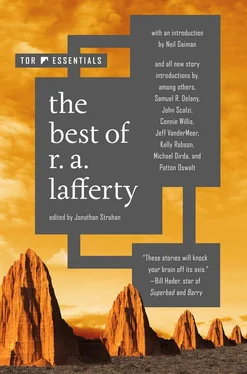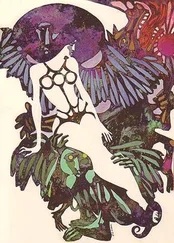“Yes. I’ll remember it a billion years for the billion who forget.”
The Dookh-Doctor was running uphill in the dark. He crashed into trees and boles as though he wished to remember the crashing forever. “I’ll burn before I forget, but I must have something that says it’s me who burns!”
Up, up by the spherical hills of the sphairikoi, bawling and stumbling in the dark. Up to a hut that had a certain fame he could never place, to the hut that had its own identity, that sparkled with identity.
“Open, open, help me!” the Dookh-Doctor cried out at the last hut on the hill.
“Go away, man!” the last voice protested. “All my clients are gone, and the night is almost over with. What has this person to do with a human man anyhow?”
It was a round twinkling voice out of the roweled dark. But there was enduring identity there. The twinkling, enduring-identity colors, coming from the chinks of the hut, had not reached the level of vision. There was even the flicker of the I-will-know-me-if-I-meet-me-again color.
“Torchy Twelve, help me. I am told that you have the special salve that solves the last problem, and makes it know that it is always itself that is solved.”
“Why, it is the Dookh-Doc! Why have you come to Torchy?”
“I want something to send me into kind and everlasting slumber,” he moaned. “But I want it to be me who slumbers. Cannot you help me in any way?”
“Come you in, the Dookh-Doc. This person, though promiscuous, is expert. I help you—”
THE WORLD AS WILL AND WALLPAPER
Introduction by Samuel R. Delany
Along with “The Primary Education of the Camiroi,” this was one of the first tales by Raphael Aloysius Lafferty (1914–2002) I read.
Where it appeared, however, I have no notion. Possibly that’s because today I know so much more about the intellectual context that informs his story than I did when I first read it, and it is easy to let the context overwhelm the tale. One suspects that is part of the story’s project. But in whose anthology—Judith Merril’s? Terry Carr’s?—I first read this piece, I have no notion at all.
I once taught a Clarion workshop at Tulane (where the students included George R. R. Martin), and I wondered if somehow Lafferty himself might be in evidence. He wasn’t. And the class was in some confusion because the young man who had set up the whole thing had also pulled out at the last minute. It’s interesting that even at that time Lafferty as a myth was so in evidence.
But what of the tale to hand?
William Morris (1834–1896) was intelligent, rich, and multitalented. He was a committed socialist, and the author of a number of fantasies, including News from Nowhere and The World Beyond the Wood . He supported a number of other artists, including Edward Burne-Jones, and he designed ornate wallpapers still used today; as well, he printed sumptuous illustrated editions of books such as the Kelmscott Works of Geoffrey Chaucer . He is one of the most written-about men of his times, and he is the avatar of the hero of Lafferty’s futuristic tale of a trip through the City of the World.
As much or more than any famous Victorian figure, it’s easy to see how the nature of Morris’s fame is entirely an accident of a social position.
Lafferty’s title riffs on the German philosopher Arthur Schopenhauer’s (1788–1860) two-volume philosophical treatise The World as Will and Representation . Schopenhauer is known for the extreme pessimism of his philosophy and the beauty of his writing.
Like a Wallace Shawn play, Lafferty’s tale takes place in a stressed future and moves from there to its distressing end.
The story begins from a seeming common-sense challenge to the classical description of a city, straight out of Jane Jacobs (“a concentration of persons that is not economically self-contained…”) and sets it at the limit of its growth: “The World City is economically self-contained.”
By the story’s end, Lafferty’s own pessimism is running neck and neck with Schopenhauer’s. Lafferty’s Catholicism was a topic often referred to by fans and critics: the other writer who sits in my mind as a (severely lapsed) Catholic is Thomas Disch. And I wonder to what extent that can be read as part of the cultural context that informs both writers.
Lafferty’s is a story of bookies and talkies and readies, where the World City is a tidy place because it tips and tilts with the tides it floats on, and Willy, whose “name game” is based on William Morris, goes to explore with Kandy Kalosh and later Fairhair Farquhar, the World City which is, of course, much too large for them to see more than a fraction of—though what of it that’s revealed, with each narrative move, is more and more distressing.
In all, “The World as Will and Wallpaper” offers a grim view of what a world as it approaches its end times requires to be self-sustaining.
The World as Will and Wallpaper
A template, a stencil, a plan.
Corniest, orniest damsel and man,
Orderly, emptily passion and pity,
All-the-World, All-the-World, All-the-World City.
—13th Street Ballad
There is an old dictionary-encyclopedia that defines a City as “… a concentration of persons that is not economically self-contained.” The dictionary-encyclopedia being an old one, however (and there is no other kind), is mistaken. The World City is economically self-contained.
It was William Morris who read this definition in the old book. William was a bookie, or readie, and he had read parts of several books. But now he had a thought: if all the books are old, then things may no longer be as the books indicate. I will go out and see what things are like today in the City. I will traverse as much of the City as my life allows me. I may even come to the Wood Beyond the World that my name-game ancestor described.
William went to the Permit Office of the City. Since there was only one City, there might be only one Permit Office, though it was not large.
“I want a permit to traverse as much of the City as my life allows me,” William told the permit man. “I even want a permit to go to the Wood Beyond the World . Is that possible?”
The permit man did a little skittish dance around William, “like a one-eyed gander around a rattlesnake.” The metaphor was an old and honored one, one of the fifty-four common metaphors. They both understood it: it didn’t have to be voiced. William was the first customer the permit man had had in many days, though, so the visit startled him.
“Since everything is permitted, you will need no permit,” the permit man said. “Go, man, go.”
“Why are you here then?” William asked him. “If there are no permits, why is there a Permit Office?”
“This is my niche and my notch,” the permit man said. “Do away with me and my office and you begin to do away with the City itself. It is the custom to take a companion when you traverse the City.”
Outside, William found a companion named Kandy Kalosh and they began to traverse the City that was the World. They began (it was no more than coincidence) at a marker set in stone that bore the words “Beginning of Stencil 35,352.” The City tipped and tilted a bit, and they were on their way. Now this is what the City was like:
It was named Will of the World City, for it had been constructed by a great and worldwide surge of creative will. Afterward, something had happened to that surge, but it did not matter; the City was already created then.
Читать дальше




![Рафаэль Лафферти - Дни, полные любви и смерти. Лучшее [сборник litres]](/books/385123/rafael-lafferti-dni-polnye-lyubvi-i-smerti-luchshe-thumb.webp)
![Рафаэль Лафферти - Лучшее [Сборник фантастических рассказов]](/books/401500/rafael-lafferti-luchshee-sbornik-fantasticheskih-ra-thumb.webp)